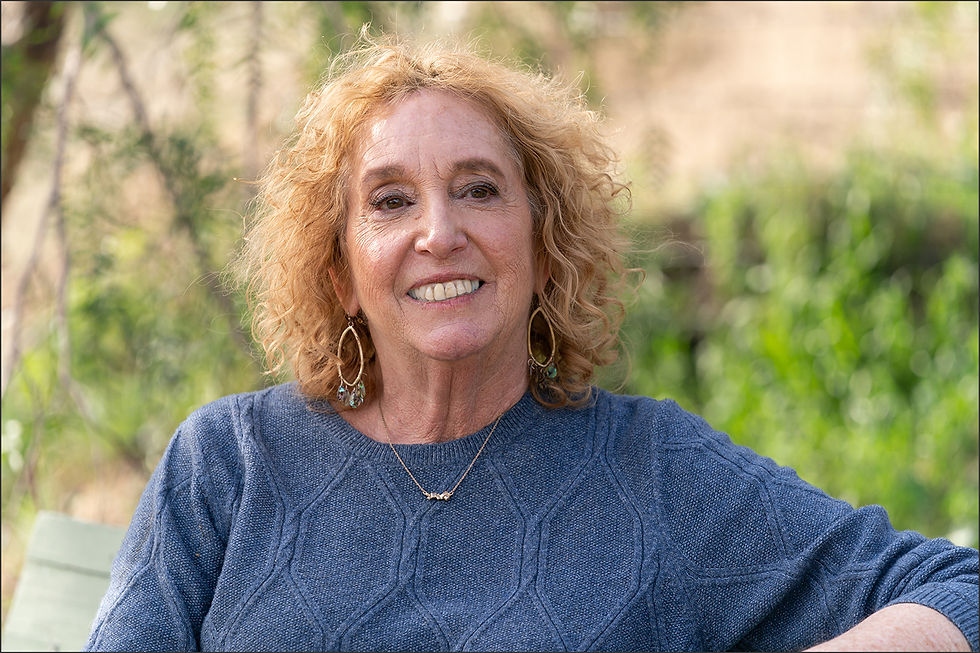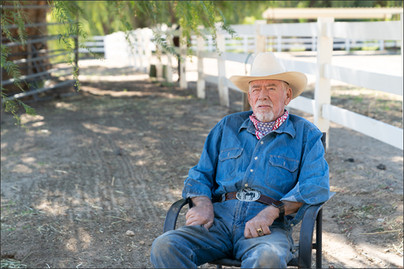- Pamela Rodi

- Sep 9, 2025
- 4 min read

Swedish filmmaker Annika Hylmö had just completed her first short film, the film festival award-winning comedy Dr. Penelope, was enjoying the critical acclaim and looking forward to pre-production on her next two projects when the COVID pandemic in 2020 shut down the film industry. Gone were the movie theatre audiences and with them the funding – donations and grants – that independent filmmakers rely on.
“It was very tough,” said Hylmö, who has been living in California for over 20 years. “I wrote scripts and made short films for many years, with the goal to make narrative films, something I’ve been working toward my whole career.” The shut-down left everything open-ended, with no clue how long it would last. Discouraged, worried about her career and her finances, Hylmö started experiencing anxiety and knew she needed to take care of her mental health.

As a youngster, the one activity that soothed her more than anything else was riding. As often as she could, Annika would make her way over to the stable and take one of the horses for a ride. “I realized I wanted to start riding again,” Hylmö said, who never formally quit riding but between getting her master's degree and her Ph. D in Communications she didn’t have time for something she once thought of as a hobby.
It took only a couple of weeks of riding regularly that made Hylmö realize this was much, much more than a hobby. Annika got back into riding three days a week, exploring new trails and vistas, and getting to know Eddie, the 10-year-old white gelding she rode regularly. Eddie had been a successful racehorse, who competed at Santa Anita and Del Mar racetracks before an injury forced his retirement.
Eddie, who would soon be Annika’s horse, did more for Hylmö’s mental health than she could have imagined. “I experienced such a dramatic change in the way I felt about myself and about my life when I was around him that I wanted to learn what this was about,” she said, leading her to discovery a therapeutic school for treating anxiety disorders and trauma called equine therapy, where the presence of a horse in the therapy sessions give clients a sense of security as they reveal their feelings. She learned that former racehorses were among the best equine therapy partners, due to their temperament and self-discipline. “I became aware of this incredibly symbiotic relationship happening across species,” Hylmö said. “We have the capacity – and the desire – to help each other, to make both of us better.”
All photos of Annika Hylmö and Eddie by Ashly Covington
Hylmö believes the narrative story-telling format will resonate more powerfully with audiences because of the emotional nature of the horse and human connection. “In a documentary, you can tell the audience what the problem is you’re trying to solve,” Hylmö said. “In a scripted story you have to make them feel it.” Films like Seabiscuit, Secretariat and Robert Redford’s classic The Horse Whisperer, have gone down in history as forever changing the way humans understand horses and, how they understand us. Steven Spielberg’s War Horse gave us a closer look at the inner life of horses and the trust that is so vital to any meaningful horse/human dynamic.

With her mission clear, Hylmö turned to her good friend and colleague, Academy Award®-winning producer Betsy Pollock, who was AFI’s head of production for 16 years. Together they produced a budget that included pre-production, principal photography and post-production, horse wrangling, ranch and stable rentals, cast and crew. One of Hylmö’s first hires was Bergitte Jorgensen of Bixi Communications to create and support an online and social media presence for Eddie’s Turn. “Fundraising for independent projects has always been difficult,” stated Pollock, “and has become even more so as the industry has contracted over the past few of years, as all independent filmmakers know. Fortunately, there are organizations like our fiscal sponsor, Film Independent, that partner with indie filmmakers to provide support, networking opportunities, outreach, etc.”
All photos of Annika Hylmö and Eddie by Ashly Covington
Annika and her team are investing in a concentrated social media and outreach campaign for Fall 2025 to support the EquuStyle article’s publication with racetracks, horse owners, breeding farms, horse clubs and more. “We believe that Eddie’s Turn can have social impact and make a difference in our world,” said Hylmö. “It’s our intention once the film is complete and we’ve finished our festival run to offer Eddie’s Turn as a fundraising tool to off-the-track thoroughbred communities and an educational tool for equine therapy centers.”
“We’re made aware every day that there’s a mental heath crisis out there,” Annika said thoughtfully, “and a need for more affordable care. It is our hope that Eddie’s Turn will help build awareness of Equine Therapy and its value, for people looking for help and for on-and-off-track racehorse owners as well.”
EquuStyle Magazine expresses gratitude to Pamela Rodi for her captivating article on the forthcoming film Eddie's Turn and Ashly Covington's photography. We extend our heartfelt thanks to all those involved in the creation of Eddie's Turn, particularly filmmakers Annika Hylmö and Producer Betsy Pollock, who aim to highlight the advantages of equine-assisted therapy for people of all backgrounds.
All images are copyrighted by Ashly Covington and Eddie's Turn Movie - all rights reserved. Reproduction for any purpose is prohibited without permission from Ashly Covington and Eddie's Turn Movie.
#eddiesturn #filmmaking #horsemovie #thouroughbreds #racehorse #ottb #equineassistedtherapy #shortfilm #racehorse #equinetherapy #therapyhorse #healthcareworksers #ICUnurses #retiredracehorse #equustyle #equustylemagazine
Please read EquuStyle Magazine's Disclaimer https://www.equustyle.com/disclaimer


















